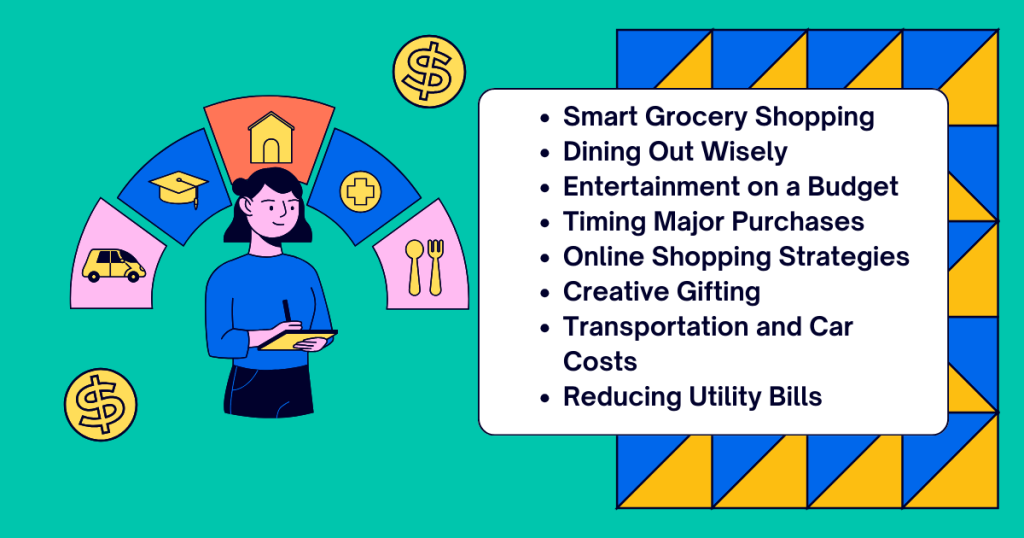In today’s fast-paced world, the art of Saving Money on Everyday Expenses has become more crucial than ever. With the ever-changing economic landscape, individuals are increasingly seeking ways to stretch their dollars further. The importance of saving cannot be overstated, especially when it comes to Saving money on everyday expenses. These small savings can accumulate over time, leading to significant financial relief. This article delves into practical strategies for reducing daily expenditures, from automating savings to smart grocery shopping and dining out economically.
Table of Contents
Automating Saving Money on Everyday Expenses
One of the most effective ways to ensure consistent savings is through automatic transfers to savings accounts. This method involves setting up a regular transfer of a specified amount from your checking account to your savings account. The benefits of this approach are twofold: it fosters a habit of saving without requiring daily attention, and it helps in accumulating savings over time.
Several apps, such as Digit and Qapital, have been designed to simplify this process. These apps analyze your spending patterns and automatically transfer small amounts to savings, making the process effortless and more efficient.
Smart Grocery Shopping
Grocery shopping is a significant part of our daily expenses, and managing it wisely can lead to substantial savings. Here are some tips for smart grocery shopping:
- Plan Ahead: Before heading to the store, check your pantry and make a list of necessary items. This helps in avoiding impulse purchases.
- Use Coupons and Loyalty Programs: Many stores offer loyalty programs that provide discounts. Combining these with coupons can lead to more savings.
- Cash-Back Credit Cards: Utilizing cash-back credit cards for grocery purchases can earn you extra savings. Some cards offer as much as 5% or 6% back on grocery purchases.
For more detailed strategies on Saving Money on Everyday Expenses, including grocery shopping, consider exploring resources like Bankrate’s Daily Savings Tips.

Dining Out Wisely
Eating out is a common expense that, if not managed, can quickly add up. However, with a few smart choices, you can enjoy dining out without breaking the bank:
- Choose Appetizers or Share Meals: Opting for appetizers or sharing main courses can significantly reduce the bill.
- Skip Extras: Foregoing drinks and desserts at the restaurant and enjoying them at home instead can also help in Saving Money on Everyday Expenses.
Entertainment on a Budget
Entertainment doesn’t have to break the bank. With a little creativity, you can enjoy a variety of activities without overspending. Here are some tips for finding entertainment on a budget:
- Seek Free or Discounted Options: Look for free days at museums or community events. Many cities offer free concerts, movie screenings, or art exhibits.
- Utilize Memberships: If you have memberships (like a library card or a gym membership), check if they offer free or discounted access to local attractions or events.
Timing Major Purchases
When it comes to buying big-ticket items like appliances or electronics, timing is everything. To get the best deals on major purchases:
- Buy During Sale Seasons: Typically, there are specific times of the year when certain items are on sale. For example, appliances often go on sale around holidays, and electronics have discounts during back-to-school sales.
- Use Price Tracking Tools: Tools like CamelCamelCamel for Amazon can help you track prices and alert you to drops, ensuring you buy at the lowest price.
Suggestions | Read Now : Budgeting for Beginners: Top 10 Simple Steps to Start Managing Your Money
Online Shopping Strategies
Online shopping can be a double-edged sword when it comes to Saving Money on Everyday Expenses. To avoid overspending:
- Implement the 30-Day Rule: When you see something you want, wait 30 days before purchasing. This helps reduce impulse buys.
- Don’t Save Billing Information: Avoid saving your credit card information on shopping sites. The extra steps required to enter payment details can deter impulsive purchases.
Creative Gifting
Gifting doesn’t have to be an expensive affair. With a bit of creativity, you can give meaningful gifts without overspending. Here’s how to approach creative gifting:
- Affordable and DIY Ideas: Consider homemade gifts like baked goods, crafts, or a photo album. These personal touches often mean more than expensive items.
- Plan and Budget: Set a gift budget for each occasion and stick to it. Look for sales throughout the year to buy gifts in advance, saving both money and last-minute stress.
Transportation and Car Costs
Transportation can be a significant expense, but there are ways to reduce these costs. To save on transportation and car costs:
- Save on Gas and Maintenance: Regular maintenance can improve your car’s efficiency. Also, using apps to find the cheapest gas nearby can lower fuel costs.
- Use Car-Sharing Services: Services like Turo or Getaround can be more cost-effective than owning a car, especially if you drive infrequently.
Reducing Utility Bills
Utility bills are a recurring expense, but you can reduce them with some smart choices. Here are tips for reducing utility bills:
- Lower Electricity and Water Usage: Simple actions like turning off lights when not in use, fixing leaks, and using energy-efficient appliances can significantly reduce bills.
- Invest in Smart Home Devices: Devices like smart thermostats can optimize energy usage, leading to lower electricity bills.
Managing Subscriptions and Memberships
In the digital age, subscriptions and memberships can silently drain our finances. To effectively manage these expenses:
- Review and Cancel Unnecessary Subscriptions: Regularly assess your subscriptions. If you haven’t used a service in a month, consider canceling it.
- Avoid Auto-Renewals and Free Trial Traps: Be wary of free trials that require credit card details. Set reminders to cancel before the trial period ends to avoid unwanted charges.
Budgeting and Financial Planning
Effective budgeting and financial planning are key to managing your finances. Here’s how to approach it:
- The 50/30/20 Budget Rule: Allocate 50% of your income to necessities, 30% to wants, and 20% to savings and debt repayment.
- Set Realistic Savings Goals: Determine what you’re saving for and set achievable targets.
- Track Spending and Manage Debt: Regularly monitor your expenses and prioritize paying off high-interest debts.
FAQs Section
How can I save money in everyday life?
- Prioritize needs over wants.
- Use budgeting apps to track expenses.
- Opt for cost-effective alternatives in daily activities.
How can I save money on expenses?
- Compare prices before purchasing.
- Utilize discounts and cash-back offers.
- Reduce energy consumption to lower utility bills.
How do you manage daily expenses?
- Keep a daily log of your spending.
- Set a daily or weekly budget limit.
- Avoid impulse purchases by following the 30-day rule.
How can I save daily cash?
- Pay in cash instead of using cards; it makes you more conscious of spending.
- Save loose change in a jar.
- Take advantage of loyalty programs and rewards.
By adopting these simple yet effective strategies, you can start to see a real difference in your financial health. Saving money on everyday expenses is not just about cutting costs, it’s about making smarter choices that align with your financial goals.




